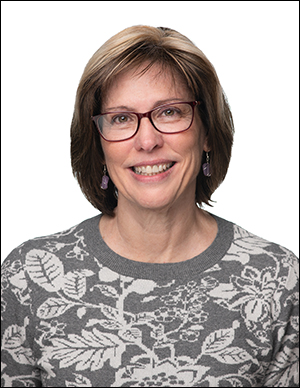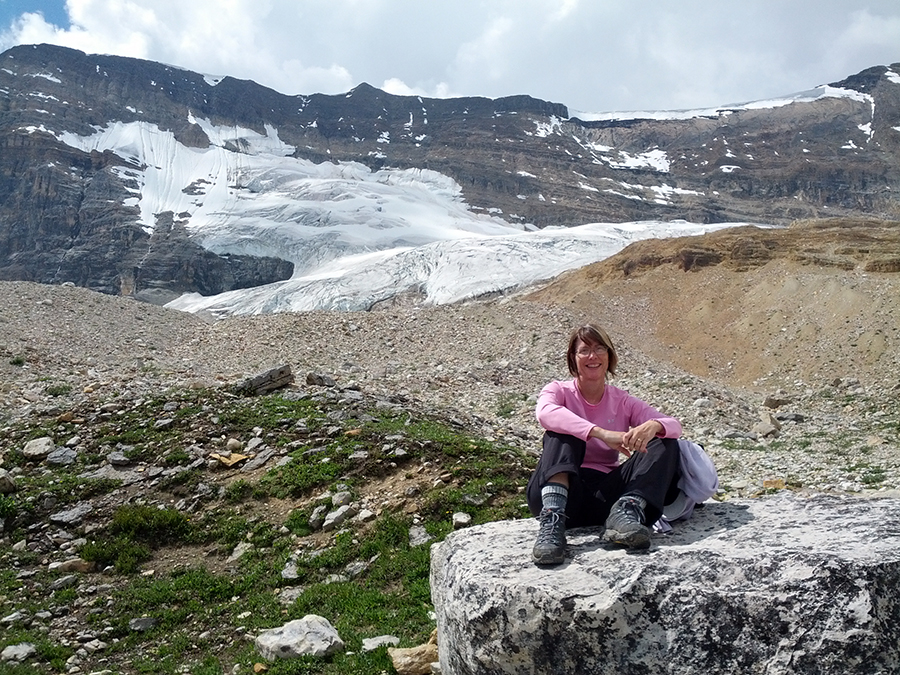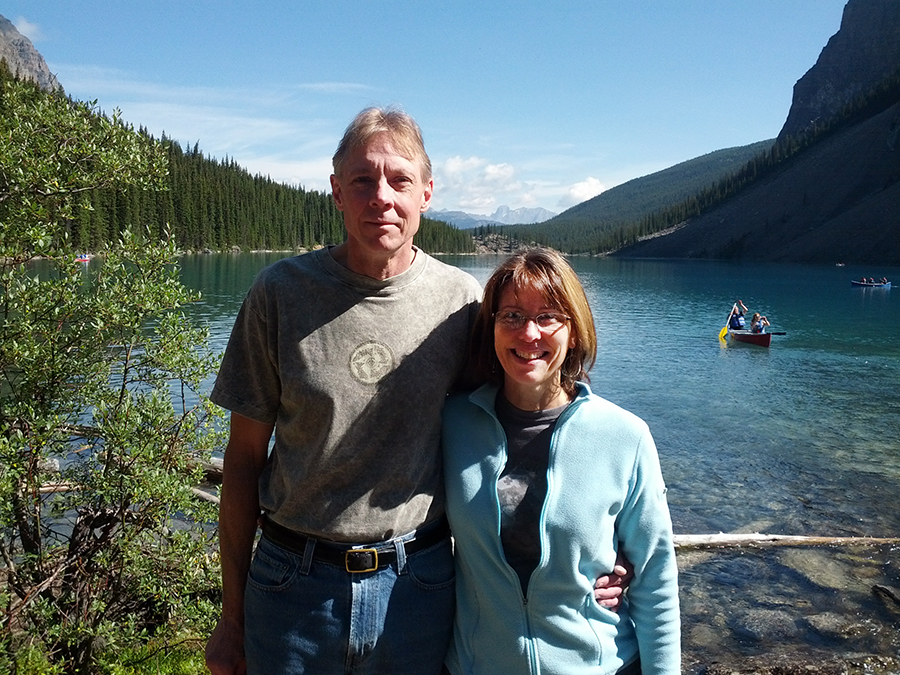News Archive
 Elizabeth Brackett, CHP, will become president of the Health Physics Society (HPS) at the 68th HPS Annual Meeting in National Harbor in July. Here Elizabeth shares her thoughts on the HPS and her health physics career. If you see her at the meeting, introduce yourself and chat about how you can help her keep the HPS a top radiation-protection society.
Elizabeth Brackett, CHP, will become president of the Health Physics Society (HPS) at the 68th HPS Annual Meeting in National Harbor in July. Here Elizabeth shares her thoughts on the HPS and her health physics career. If you see her at the meeting, introduce yourself and chat about how you can help her keep the HPS a top radiation-protection society.
Why did you run to be the HPS president?
I've been involved with the HPS in several capacities for much of my career and have greatly enjoyed the interactions with other members. I generally prefer to be a behind-the-scenes person—I'm somewhat uncomfortable being the focus of attention (my husband and I got married alone in a county courthouse to avoid it), so I had previously said that I didn't think running for president was for me. However, when asked again in 2021, still in the throes of the pandemic and life seeming stalled, it seemed like a good opportunity to make a change. I missed the interactions with colleagues, so my husband and I discussed it and thought it would be a good way to break out of the pandemic rut and travel once again, visiting the chapters and meeting with members. Unfortunately, the pandemic had a longer-lasting impact than we anticipated, and some chapters continued to meet virtually. In addition, my husband began having serious medical issues about the time that my term started so that also prevented me from traveling. I visited many chapters virtually and was able to visit with a handful in person. The in-person meetings were wonderful, and I apologize to those that I wasn't able to attend in person!
How would you summarize your health physics career (first and last jobs, changes from start of career to now, etc.)?
Specialized. It wasn't intentional, but I've spent pretty much my entire career in internal dosimetry. My first job in the industry was a summer job during grad school performing whole-body counts and respirator fits at the Vermont Yankee Nuclear Plant. After school I worked at the Yankee Atomic Electric Company (YAEC) Environmental Laboratory. While I spent some time in the TLD lab and counting room there, I was again primarily involved with whole-body counting and developing internal dosimetry procedures. I went on to serve as the internal dosimetrist at Oak Ridge National Lab and the Dosimetry Program manager for Martin Marietta Energy Systems Central Staff, and then to consulting. I currently work for the MJW Corporation, a small consulting firm with a specialty in internal dosimetry. There I've had the opportunity to provide internal dosimetry expertise to a number of clients, as well as to participate in the development and teaching of an advanced internal dosimetry course. For the last 20 years, my primary position has been the principal internal dosimetrist for the contractor team on the Energy Employees Occupational Illness Compensation Program.
When and why did you join the HPS?
I joined in the early 1980s as a graduate student at the University of Lowell (now UMass Lowell). The faculty, and in particular my advisor, Dr. Ken Skrable, were very involved in the Society, so it seemed like an important thing to do. Dr. Skrable encouraged the students to attend the annual meetings and present their research. I did let my membership lapse a bit after graduating. While I was still active in my local chapters, I was lazy about upgrading from student to full member of the national Society, so the HPS website shows that I've been a member since 1993. I initially wrote that I was embarrassed by this lapse, but in reading through some of the past presidents' responses, I see that Eric Goldin did the same thing about a decade earlier (but for better reasons), so I'm in good company!
Did you learn anything new about the Society during your time as president-elect?
There have been a few changes since I last served on the Board, but I don't think I learned anything new.
Did you have any surprises during your time as president-elect?
I was a bit surprised at the current state of the Society. There are fewer members than I realized, with many chapters and several committees languishing. Some of the committees have been slowly losing members without replacements and will have none at the start of the coming year.

Liz on the Iceline Trail at Yoho National Park, British Columbia, Canada
Submitted photo
How has the COVID pandemic affected the HPS?
As noted in the previous response, we've been losing members. While the pandemic wasn't the initial cause of the downward trend in our membership numbers, it does seem to have accelerated it. Multiple chapters have had the same leadership for several years because they can't find members willing to serve, and we appear to have lost several chapters entirely over the last few years. Meeting attendance has not yet recovered from the restrictions enacted during the pandemic.
On the positive side, I believe that the implementation of virtual meetings presents us with new opportunities. While the in-person attendance of meetings, particularly the annual meeting, is beneficial for connecting and interacting with colleagues, catching up on the latest advances, information, and products, and meeting with committees or other professional groups, the use of virtual meetings throughout the year provides additional opportunities to learn something new, earn continuing education credits, and stay connected to your peers, particularly for those unable to travel.
As president, what are your plans and goals for the coming years?
My primary goal is to reverse the downward trend in membership and get things back on track. Most of my career has been spent in positions where I was responsible for getting people to work together and accomplish specific goals without having any actual authority over them, so I'm hoping that experience will serve me here. My main focus will be on the operations of the Society, including the organization and documentation of our processes and procedures. Past Boards have developed plans that were followed for a short time after they were enacted but then we seem to lose track of them and try to reinvent the wheel every decade or so. The implementation of a formal strategic plan tracking system and the formalization of a Strategic Planning Advisor role have been extremely beneficial to tracking the progress of in process items; we need a system to ensure they continue to be implemented once completed.
What are your plans to enhance Society support to students and young professionals?
We have an opportunity to reshape the Society as we emerge from the pandemic and the younger members have an important role to play in that. The Society will soon belong to them so I'd like to get their input as to what they think it should look like—what's important, and what's not so important. I hope to get more young members involved in committees so we can ensure that we're addressing their concerns and that we're accessing and using the latest technologies of interest to members.
This year, we're able to offer complimentary childcare at the annual meeting in National Harbor in the hopes of making it more accessible to young families. Thanks to my limited travel and the support of my employer, the MJW Corporation, for the travel I did do, we were able to use the president-elect travel allotment to fund the effort. We hope to make this a continuing offering at future meetings.
Do you have plans to make any additional significant changes in Society governance?
Now that there have been several years' experience with the last change (i.e., increasing the president's term to 2 years and reducing the number of directors from 9 to 6), the Board is in the process of proposing a modification to the number of directors. If passed, this proposal will make the Board more flexible, with a minimum of 6 directors and a maximum of 12, depending on need. I don't anticipate any additional changes during my tenure.
What can HPS members do to aid you in your job as president?
Get involved! Local chapters are in great need of active members. Another casualty of the pandemic was committee membership. Several face the prospect of few to no members continuing in the coming year. I've recruited many members but there are still a number of openings. Please check out the committee descriptions and let me know if you'd like to serve on one. Time commitment varies a fair bit across the committees so there's something for almost everyone. I'd also encourage you to run for office, particularly if you're not happy with the current state of things—the best way to effect change is to get involved. Remember that we are a volunteer organization, and we can't continue on without members willing to help.
What is one of the most fun things you've done as a health physicist?
Attend HPS meetings! Seriously, the most fun I have as an HP is interacting with colleagues, many of whom are good friends. Working in the counting room at the Yankee Environmental Lab was a lot of fun, and I met my husband at a state-of-the-company address by the YAEC president during the buffet and open bar gathering that followed. When performing body counts during a plant outage, the trades workers would bring me candy and sing to me while being counted. There were a lot of fun times at Bioassay Conferences, particularly in Reno where we got a coworker hooked on gambling (just during the meeting, and he apparently doesn't even remember) and in Jackson Hole where we had a close encounter with buffalo at Yellowstone. My current job used to require frequent travel to Cincinnati so the company leased a bed and breakfast where several of us would stay for three to four days at a time. It was like living in a frat house, cooking and hanging out together, and we became like family. We would joke that we'd complain to our spouses about having to travel but most had been to the house at some point so had no sympathy.

Tom and Liz at the end of the Moraine Lake trail in Alberta, Canada
Submitted photo
What do you like to do in your down time (do you have any down time)?
Free time has been scarce recently, but I like to bake and can squeeze that into a free evening on occasion because I primarily make cookies, and many aren't too time consuming. When I was still traveling for work, I'd pack a separate carry-on bag of cookies at Christmas to bring to my coworkers—I weighed it once and it was 13 pounds! I've taken several classes at the King Arthur Baking Company in Vermont. My sister, two nieces, and I have even spent a few vacations there. My husband and I like to hike, particularly in the Canadian Rockies. Between the pandemic and recent health issues we've mostly done shorter, local hikes in the last few years, but we hope to get back there again sometime.




